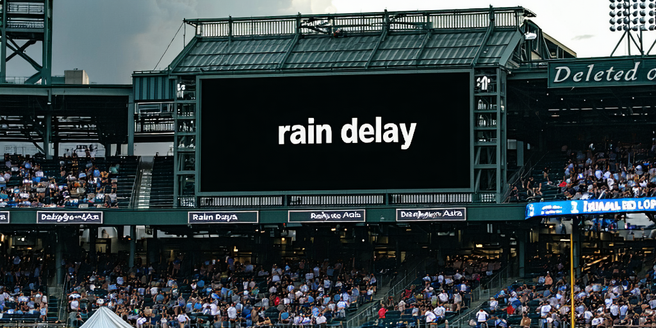
Understanding Weather Conditions Affecting Baseball Games
Weather can be a significant factor in baseball, impacting games in various ways. Rain, wind, temperature, and humidity all play roles in how a game progresses. Rain is especially disruptive, as it can halt games entirely for safety reasons. Wet fields can become slippery, posing a risk for players. Additionally, pitchers and fielders struggle to maintain grip with wet equipment. Umpires and officials must gauge when conditions are unsafe, leading to potential delays or postponements. In contrast, wind can affect the travel of the ball, giving advantages or disadvantages to batters. Understanding these weather conditions helps to appreciate the complexity of outdoor sports like baseball.
How Rain Delays Are Determined and Communicated
Rain delays in baseball are determined by a combination of real-time weather monitoring, field inspections, and safety considerations. Umpires, in consultation with team managers and stadium officials, make decisions to postpone or delay games based on the intensity of rain and the condition of the field. Communication about delays is crucial. Announcements are made over the stadium’s PA system and via social media, allowing teams and fans to stay informed about the status of a game. Determining the precise moment a delay is necessary requires coordination and judgment, balancing fair play and player safety.
Impact of Rain Delays on Team Strategies and Morale
Rain delays can significantly affect team strategies and morale. When a game is paused, coaches may adjust their lineups or pitching rotations. Players must stay mentally prepared, often practicing patience as they await the game to resume. For teams on a winning streak, a delay could disrupt their momentum, impacting overall morale. Conversely, struggling teams may use the pause as an opportunity to regroup and strategize anew. The uncertainty and waiting can be challenging, requiring focus and resilience. How teams handle such interruptions can influence their performance and dynamics both on and off the field.
Technologies Used to Predict and Manage Weather Delays
Technology plays a pivotal role in predicting and managing weather delays at baseball games. Modern stadiums utilize sophisticated weather-tracking systems that provide real-time updates on approaching weather fronts. Advanced radar and satellite imagery allow officials to anticipate rain and make informed decisions about game delays. In fact, these systems can predict weather changes up to several hours in advance, allowing teams to prepare accordingly. Some systems are integrated with communication tools to alert officials and fans promptly. Additionally, apps and tools provide players and coaches with detailed weather data, aiding in strategic planning. Technological advancements have made it easier to safeguard players and maintain the integrity of the game amidst unpredictable weather.
Historical Examples of Notable Rain-Delayed Games
Throughout baseball history, several games have become famous due to significant rain delays. One such instance occurred during the 2008 World Series between the Phillies and the Rays, where Game 5 was delayed due to rain and subsequently resumed 48 hours later. This delay not only tested the patience of players and fans alike but also became a talking point regarding the policies on game cancellations. Another memorable rain delay was in 1993 when a game between the Cubs and the Expos was delayed for over two hours, leading to an eventual suspension. Studying these instances highlights the unpredictable nature of outdoor sports and provides insights into the best practices for managing such challenges.
Tips for Fans: Dealing with Rain Delays at the Stadium
For fans attending baseball games, rain delays can be frustrating but manageable with the right approach. First, check the weather forecast before heading to the stadium and pack accordingly. Waterproof gear like raincoats and ponchos can keep you dry. Staying informed through social media or stadium updates ensures you know the status of the game. Engaging with fellow fans in light-hearted conversation or games can pass the time. Additionally, exploring the stadium’s amenities, such as food vendors or merchandise shops, can keep spirits high. Being prepared and maintaining a positive attitude can enhance the overall experience, even amidst rain delays.
